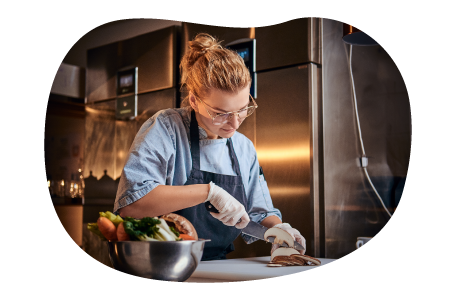
Why do personal chefs need insurance?
If a customer claims your meal caused an allergic reaction, the result could be a lawsuit. Personal chef insurance policies cover legal disputes, along with injuries, data breaches, and stolen equipment. State laws and client contracts may require you to have coverage.

Find the right coverage
Insureon helps personal chefs find insurance that matches their unique risks.
Get free expert advice and peace of mind knowing you have the right property and liability coverage for your small business.
What types of personal chef insurance do I need?
These policies cover the most common risks faced by personal chefs.
Business owner’s policy
Personal chefs can often bundle commercial property insurance and general liability coverage in a business owner's policy, or BOP, at a discount.
- Customer bodily injuries
- Stolen or damaged business property
- Business interruption incidents
Workers’ compensation insurance
Most states require workers' comp for personal chef businesses that have employees. It also protects sole proprietors from work-related medical costs that health insurance won't cover.
- Employee medical expenses
- Disability benefits
- Workplace injury lawsuits
General liability insurance
A general liability policy covers third-party risks, such as customer injuries, property damage, and advertising injuries. Clients may require personal chefs to carry this coverage.
- Slip-and-fall accidents
- Damaged customer property
- Libel and slander lawsuits
Commercial auto insurance
This policy covers legal costs in the event of an accident involving a personal chef's vehicle. Almost every state requires this coverage for vehicles owned by a business.
- Lawsuits from other drivers
- Property damaged by your vehicle
- Vehicle theft and vandalism
Liquor liability insurance
Personal chefs depend on this policy for protection against legal fees when an intoxicated customer causes harm. It's needed because general liability excludes alcohol-related claims.
- Injuries caused by intoxicated customers
- Property damage caused by intoxicated customers
- Compliance with laws and contracts
Cyber insurance
This policy helps personal chef services recover financially from data breaches and cyberattacks. It’s sometimes called cyber liability insurance or cybersecurity insurance.
- Data breach notification costs
- Fraud monitoring services
- Cyber extortion payments
How much does personal chef insurance cost?

A personal chef who works independently can expect to pay less for insurance than a bigger business.
Factors that affect your personal chef insurance cost include:
- Type of work you do, such as catering or cake baking
- Business property and equipment, such as a commercial kitchen or food truck
- Business revenue
- Location
- Types of insurance purchased
- Deductible and coverage options
- Per-occurrence and aggregate policy limits
- Claims history
How do I get personal chef insurance?
It's easy to get personal chef or private chef insurance if you have your company information on hand. Our application will ask for basic facts about your business, such as revenue and number of employees. You can buy a policy online and get a certificate of insurance with Insureon in three easy steps:
- Complete a free online application.
- Compare insurance quotes and choose a policy.
- Pay for your policy and download a certificate.
Insureon's licensed agents work with top-rated U.S. insurance companies to find the right coverage for your business needs, whether you’re an independent chef or you hire employees.
Verified business insurance reviews
Hear from customers like you who purchased small business insurance.
FAQs about personal chef insurance
Review answers to frequently asked questions about business insurance and licensing for personal chefs.
Do you need a license to be a personal chef?
Whether you need a license depends on where you work, as well as the type of services you offer, such as delivery.
Here are a few examples of when a chef or other food business might need a license or certification:
- City, county, or state laws likely require you to get a business license, regardless of the type of work you do. This involves filling out a form, paying an application fee, and obtaining an employer identification number (EIN).
- Local laws might require a food handlers card for you or your employees in order to work in the food service industry. This card certifies that you understand basic food safety practices.
- The laws in some jurisdictions require a catering license for certain business operations, such as a food vendor that delivers meals to clients or serves alcohol.
- You may also need a health permit from your local department of public health if you operate out of your own kitchen. The department will send someone to inspect your kitchen before issuing the permit.
Do I need personal chef liability insurance if the catering company I work for already has coverage?
If you're included as an additional insured on a catering company's liability insurance policy, or otherwise covered, there are still a few reasons why you might want to buy insurance for yourself. For instance, you might want coverage in the following scenarios:
- You don't have the right policy. For example, your employer might provide general liability insurance, but not workers' compensation insurance. Your health insurance won't cover work-related injuries, such as cooking burns and cuts, so you decide to buy your own workers' comp policy.
- You don't have the right amount of coverage. Though you're covered under a policy, you worry you don't have enough protection in the event of a lawsuit. You decide to buy your own policy with higher limits to avoid paying for legal costs out of pocket.
- You prefer to have your own representation. Your employer's policy will pay for a lawyer—and decide how you're represented. You think you'd be better off with a policy where you have better control over the situation in court, especially since your employer might put their own interests first in the event of a lawsuit.
What is the difference between a private chef and a personal chef?
Though you might hear the terms used interchangeably, there are a few key differences between personal chefs and private chefs. Here's a quick breakdown:
- A personal chef prepares meals for several clients. Personal chefs usually have their own kitchen where they cook meals and then deliver them to clients' homes or offices.
- A private chef typically works for one client. For instance, a private chef might live and work in a client's home and handle all of their grocery shopping, meals, special events, and clean up.
Because they work for more people, personal chefs learn how to prepare a wide range of foods, while a private chef might focus on the needs of the individual or family they work for. Personal chefs might need more insurance coverage as their business requires its own kitchen and vehicle, in addition to food and kitchen supplies.
What other types of insurance are recommended for personal chefs?
In addition to the insurance policies mentioned above, personal chefs should consider the following types of coverage:
- Product liability insurance: This policy helps pay for legal costs related to product defects, allergic reactions, food poisoning, and similar claims.
- Tools and equipment insurance: Because commercial property insurance will only cover items at your business address, personal chefs need additional coverage for their equipment and other property that travels to clients. This type of inland marine insurance covers your business property wherever it goes.
- Hired and non-owned auto insurance (HNOA): Your personal auto policy won't cover business-related driving, which is why personal chefs need HNOA. This policy provides auto liability coverage for personal, leased, and rented vehicles used for work purposes.
